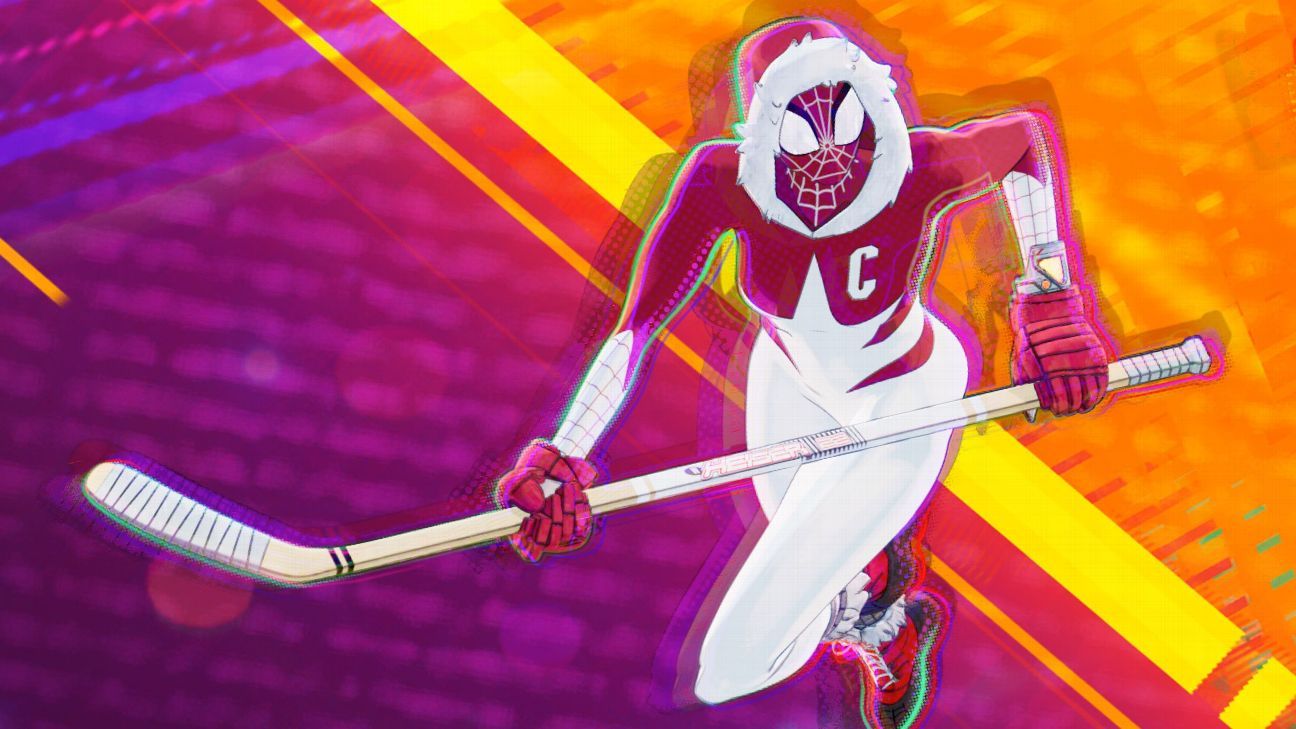There are many Spider-people in “Spider-Man: Across the Spider-Verse,” the hit animated sequel in which Miles Morales, Brooklyn teen turned Spider-Man, enters a multiverse of variants.
But in that vast collection of web-slingers, only one is holding a hockey stick. Which is appropriate, because only one is wearing a Canadian national team sweater, too.
Spider-Canada is a stick-wielding Spider-Woman with a captain’s “C” on her maple leaf-adorned jersey. She’s an original character created for the film, having never appeared in any other form of Spider-Man media. She pops up in several scenes, her distinct look separating her from the crowd of web-crawlers.
The character was partially born out of the filmmakers’ sports fandom. Phil Lord and Chris Miller, writers and producers on the film series, love sports. So do directors Justin K. Thompson and Kemp Powers, as well as production designer Patrick O’Keefe.
“We sneak in sports stuff sort of everywhere,” O’Keefe told ESPN, “but no one’s really a hockey fan except for myself, being Canadian. So I wanted to find a special shoutout to Canada.”
O’Keefe, a Toronto Maple Leafs fan, said many of the animators who worked on “Across the Spider-Verse” are from Canada. Sony Pictures Imageworks is based in Vancouver and has a growing presence in Montreal, so this was also an homage to them.
But Spider-Canada was primarily born of necessity: The movie’s multiverse story requires a great number of Spider-people in the background during Miles’ travels beyond Earth-1610.
The film features other international Spider-people, like Malala Windsor’s Spider-UK and Pavitr Prabhakar, from a multiverse version of India. So O’Keefe worked with character designer Kris Anka on a Canadian Spider-Woman.
“We were just looking for more diversity and more fun in creating some more characters,” O’Keefe said. “So we pitched the idea of doing Spider-Canada and it clicked right away.”
Her suit is a nod to the 1972 Summit Series, an exhibition where Canada defeated the Soviet Union in one of the most famous hockey battles in history. Like Gwen Stacy’s Spider-Woman, Spider-Canada has a hood — only this one is lined with fur and goose down. Unlike Stacy, Spider-Canada wears Sorel boots and hockey gloves.
O’Keefe said making Spider-Canada a woman was important to him as a Canadian hockey fan, giving him a chance to honor players such as Hayley Wickenheiser and Cassie Campbell-Pascall, who played for Team Canada. The Canadian women’s national team is literally the gold standard in the sport: It has won seven gold medals at the Olympics and another 12 at the IIHF world championships.
“We’ve just got this incredible history and this growth of women’s hockey in Canada, and we’re always looking for diversity on this film,” he said. “And so it was an obvious choice to just make her this bruiser of a hockey player. That’s how she was born.”
What the filmmakers didn’t anticipate was how often Spider-Canada would appear in the film and on posters for it.
“You know Canadians. We’re always ready to talk about everybody who’s Canadian, everywhere they are. We’ve got so much pride. So all the Canadian animators just started putting her in every single scene,” O’Keefe said. “And Phil [Lord] was like, ‘She’s going to be the death of me, man. She’s in every shot now.’ And I’m like, ‘We just designed her and made her appealing. Now we’re just giving the people what they want.”
In superhero lore, there’s a legacy of iconic characters who were pulled from other media into comics rather than vice versa. Harley Quinn, for example, appeared on “Batman: The Animated Series” before ever showing up in print.
Could Spider-Canada make the same crossover after her “Spider-Man: Across the Spider-Verse” debut? Or, to paraphrase countless Stan Lee comics: Is this the end of Spider-Canada?!
O’Keefe hopes to see the character again.
“I would absolutely love to see her traveling through the multiverse, putting pucks on net,” he said.
